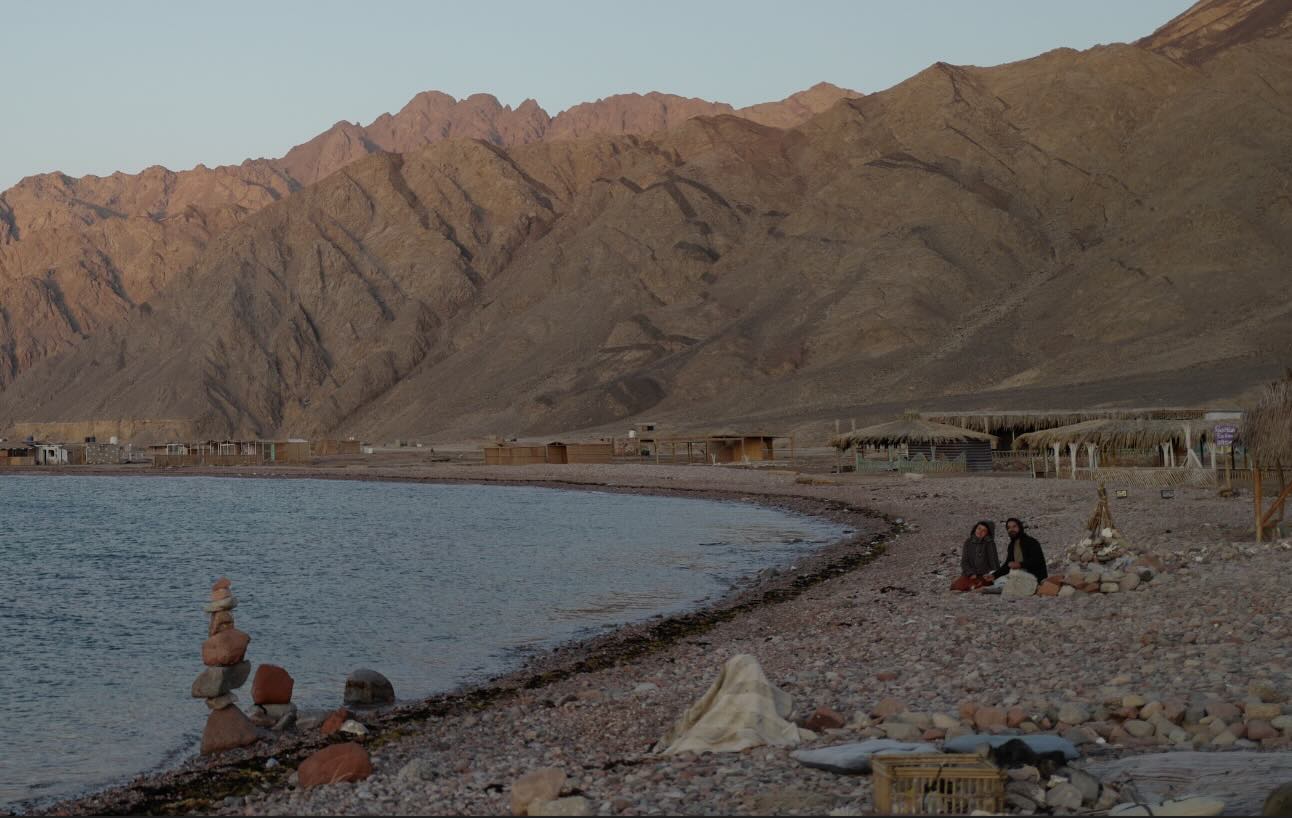Abu Galoum, Where Spiritual Energy Gathers
Click here to view Chinese version
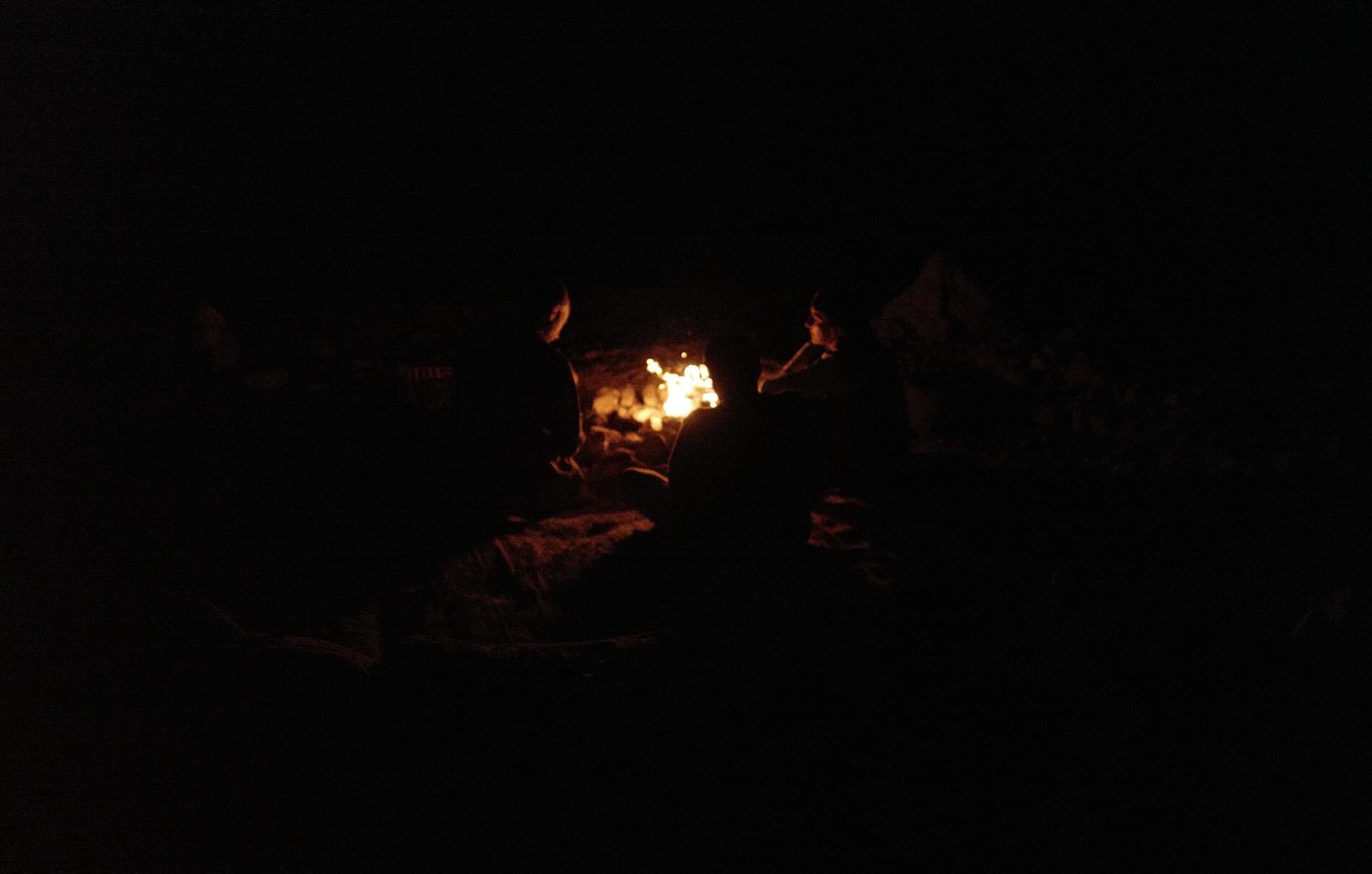
One night, I had a strange and luminous dream.
In the dream, an old friend whom I hadn’t seen for a long time was sitting with several silent souls by the sand dunes in the mountains of Dahab. The firelight danced gently between them, grains of sand whispered in the night wind, and they softly chanted prayers, as if the heavens and the earth were listening. When I awoke, I immediately picked up my phone and sent this fleeting vision to that friend via Facebook.
This friend had lost everything in the global storm of COVID—his company, his career, his former identity. But it was precisely in the ruins of that collapse that he reconnected with another gift within himself. He began to respond to the energies that had long lain dormant in his being, stepping onto a completely different path. Today, he is a spiritual healer in Tel Aviv, guiding each soul who enters his life, helping them remember who they are, where they come from, and why they came.
Upon hearing about my dream, he replied:
“How incredible… Lately, I’ve been walking alongside an Israeli shaman. We truly did practice spiritual work together in the mountains of Dahab. Those nights, the firelight, the whisper of the wind—they’ve stayed with me ever since.”
He paused, as if letting the memories rise up from the sand.
”Abu Galoum”
“To set out from Dahab, you must first reach the Blue Hole — it is the gate of water. Then, either follow the sea by boat, carried by the current, or cross the mountains on foot, letting your soles touch the pulse of this ancient land.”
“If you go to Dahab, you must go there — to Abu Galoum.”
“And from there — step into my dream.”
“Mustafa — find that man’s camp. Tell him: you are my friend.”
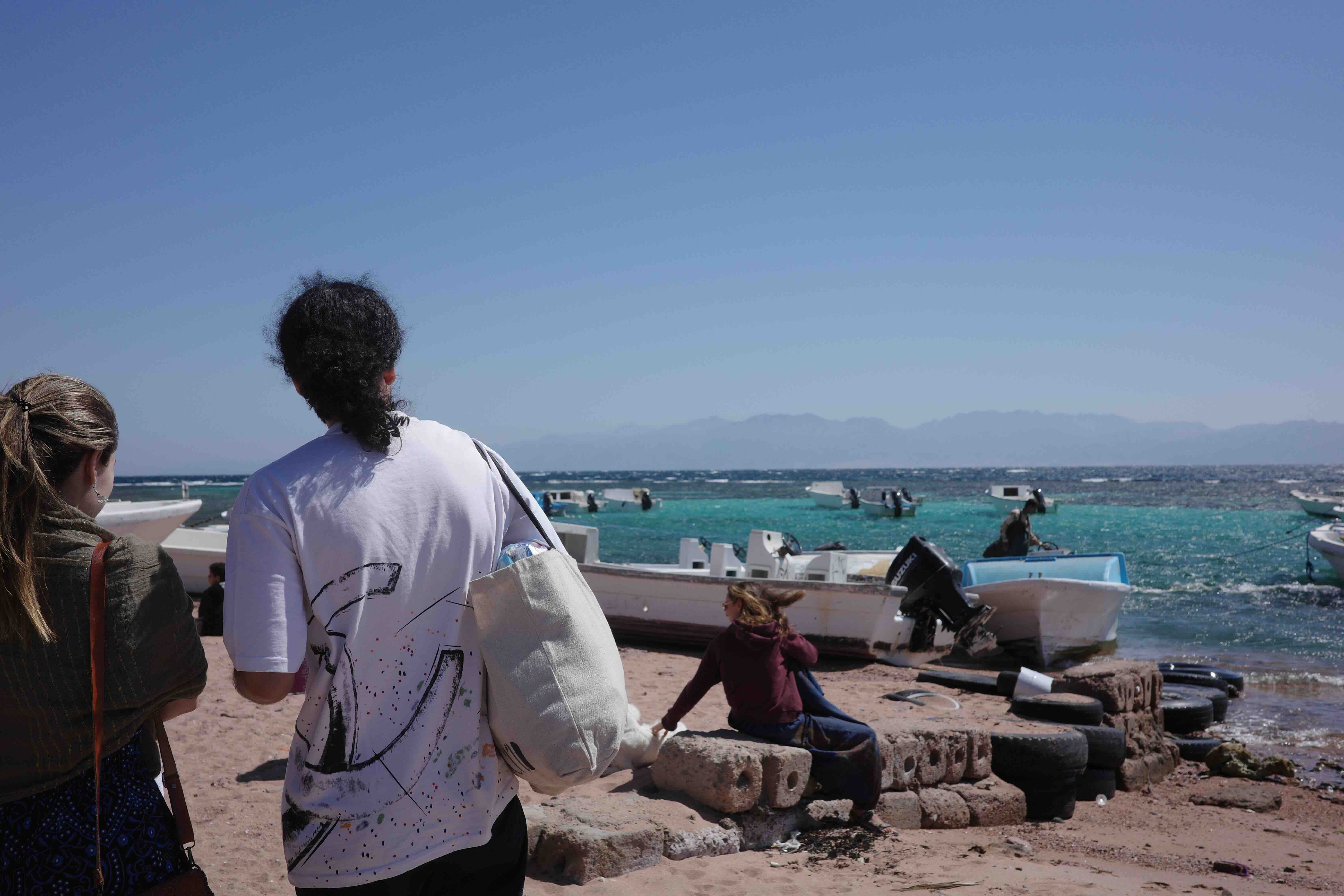
I still can’t quite believe it — that I’m really on the little boat to Abu Galoum.
The sea glimmers silver-blue in the morning light, and the air is laced with salt and the stillness of a sun yet to rise.
And our old friend Ayed — the one who once led us through the mountains of the Sinai before dawn, the quiet, shy driver who first brought us into Dahab — this very morning, he brought us once again to a small shoreline near the Blue Hole, where a boat to the unknown awaited.
By the time we arrived, a few fellow travelers had already gathered at the shore. Aside from us, nearly everyone carried a heap of luggage. Some were headed to the lagoons north of Abu Galoum for kite surfing; others were regulars at the Abu Galoum camps, loading box after box of supplies they had brought from Dahab.
The Bedouins moved nimbly, leaping between the boat and the shore.
“This one! That one! Yallah! Yallah!” (Hurry! Hurry!)
People passed the luggage along like a game of relay, lifting, handing, stacking — as if no one really knew what belonged to whom. In that moment, belonging was a vague idea. The cargo, like the bodies, simply boarded the boat with destiny.
I climbed aboard and sat off to the side, anxiously scanning for my bag. My eyes swept over layers of luggage, as if searching for a shadow I had seen in a dream.
Just then, a girl noticed the look on my face. She smiled gently and pointed toward a corner of the boat.
“Don’t worry,” she said. “It’s on the boat. When you get off, it will come to you.”
I paused — then laughed.
In a matter of minutes, I had experienced a small disillusionment, and awakening, about the notion of “ownership”. There I was, perched on the edge of the boat, looking slightly ridiculous — and maybe a little endearingly clueless.
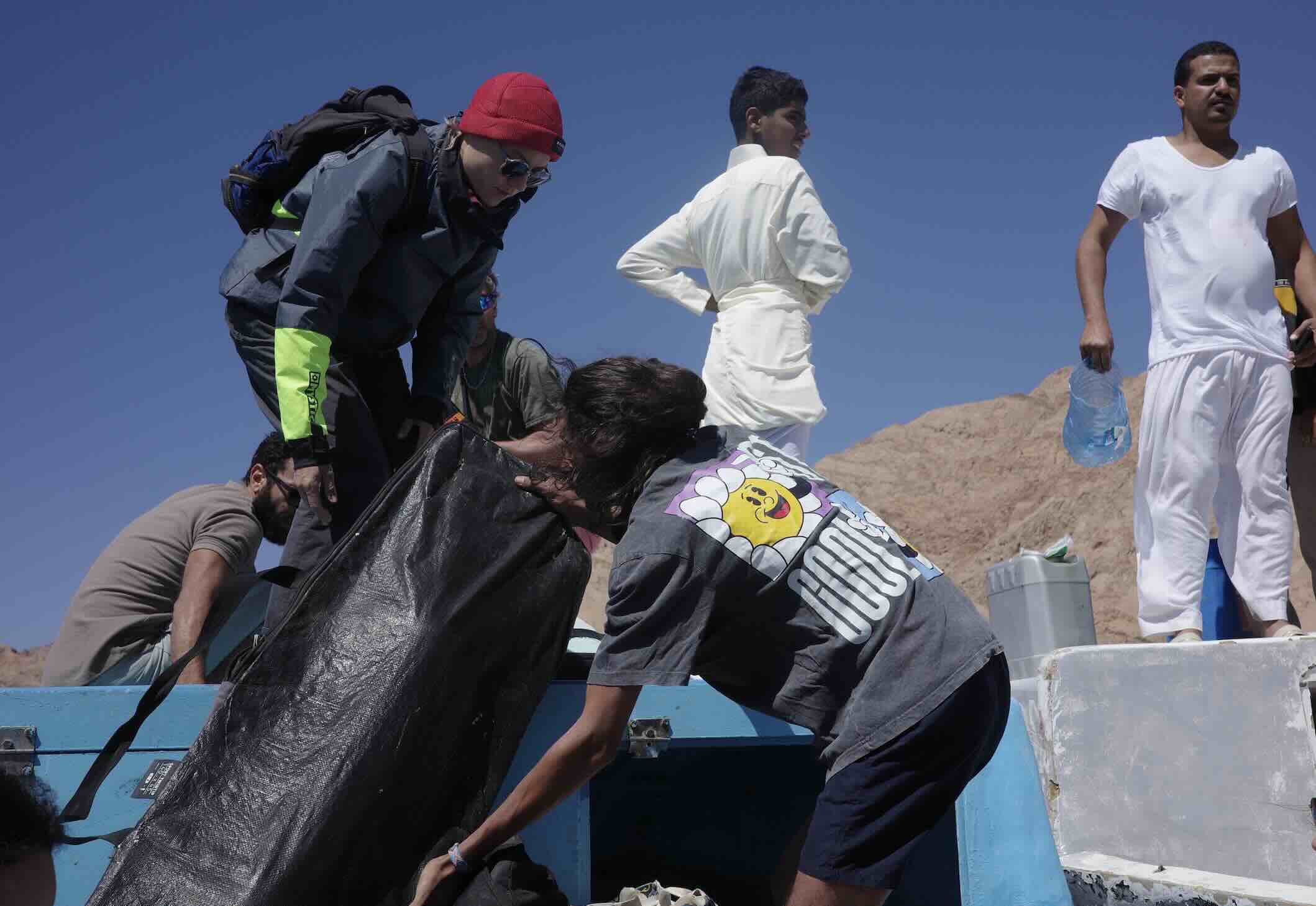
A strong northeasterly wind was blowing that day.
The Red Sea was far from its usual calm — waves rose higher and higher, the surface heaving restlessly.
Our little boat charged straight into the wind and surf at full speed. Each time the bow crested a wave, it felt as if we were being lifted into the air, momentarily weightless — and then came the plunge. The boat slammed down hard into the next trough with a thunderous crack, sending sprays of seawater flying, the sound echoing through the hull.
There were no safety measures on board. With the boat rocking wildly, threatening to throw us into the Red Sea at any moment, all we could do was huddle closer together, arms linked, our bodies swaying and jolting in rhythm with the boat. It felt like an impromptu roller coaster at sea — some screamed, some laughed, and the wind tore through our hair and the corners of our eyes.
“Inshallah!” (God willing!)
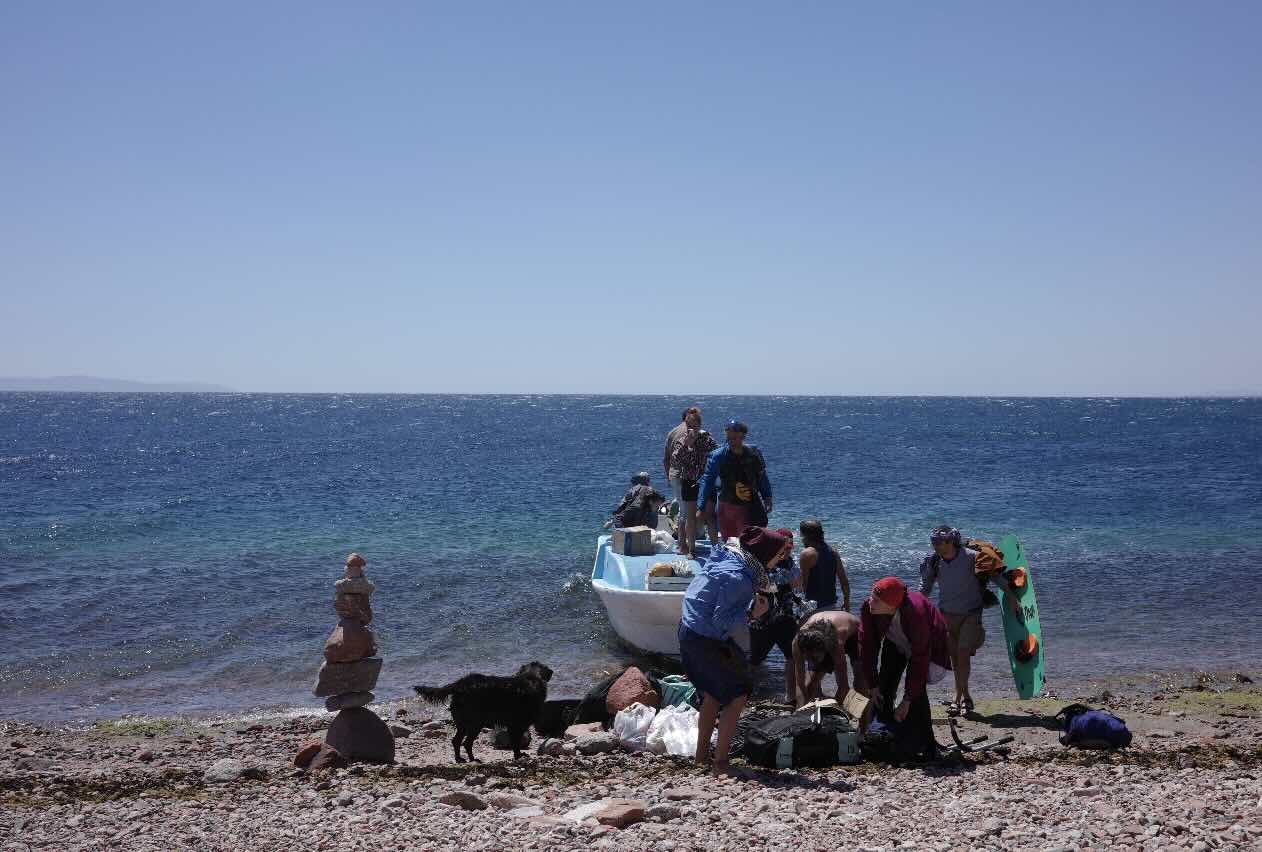
After drifting through the crashing waves on that tiny boat for what must have been thirty minutes to an hour, we finally saw the outline of our destination.
To the left stretched a vast Quaternary alluvial fan — gravel and sand laid down by ancient rivers, the silent remnants of the earth’s breath, wide and still. Scattered across this expanse were clusters of thatched huts, varying in size, placed as if at random by the wind.
There weren’t many of these huts, and most stood empty, seemingly occupied only by time and breeze.
Our boat slowly approached the shore in front of one small cluster. Before we had even come to a full stop, a large black dog came running to greet us, its fur rippling in the wind, as though it had long grown used to the coming and going of boats and strangers.
“Luna!” some of the people on board called out with smiles, naming her.
Getting off the boat was just like getting on — there was no fixed order, and no one in charge. Everyone moved like water, flowing naturally into a rhythm of passing and unloading the luggage and supplies. One by one, the items were handed down.
A few of the people who lived in the huts emerged quietly to help with the unloading. No one said much. Everything was quiet — just enough, just right.
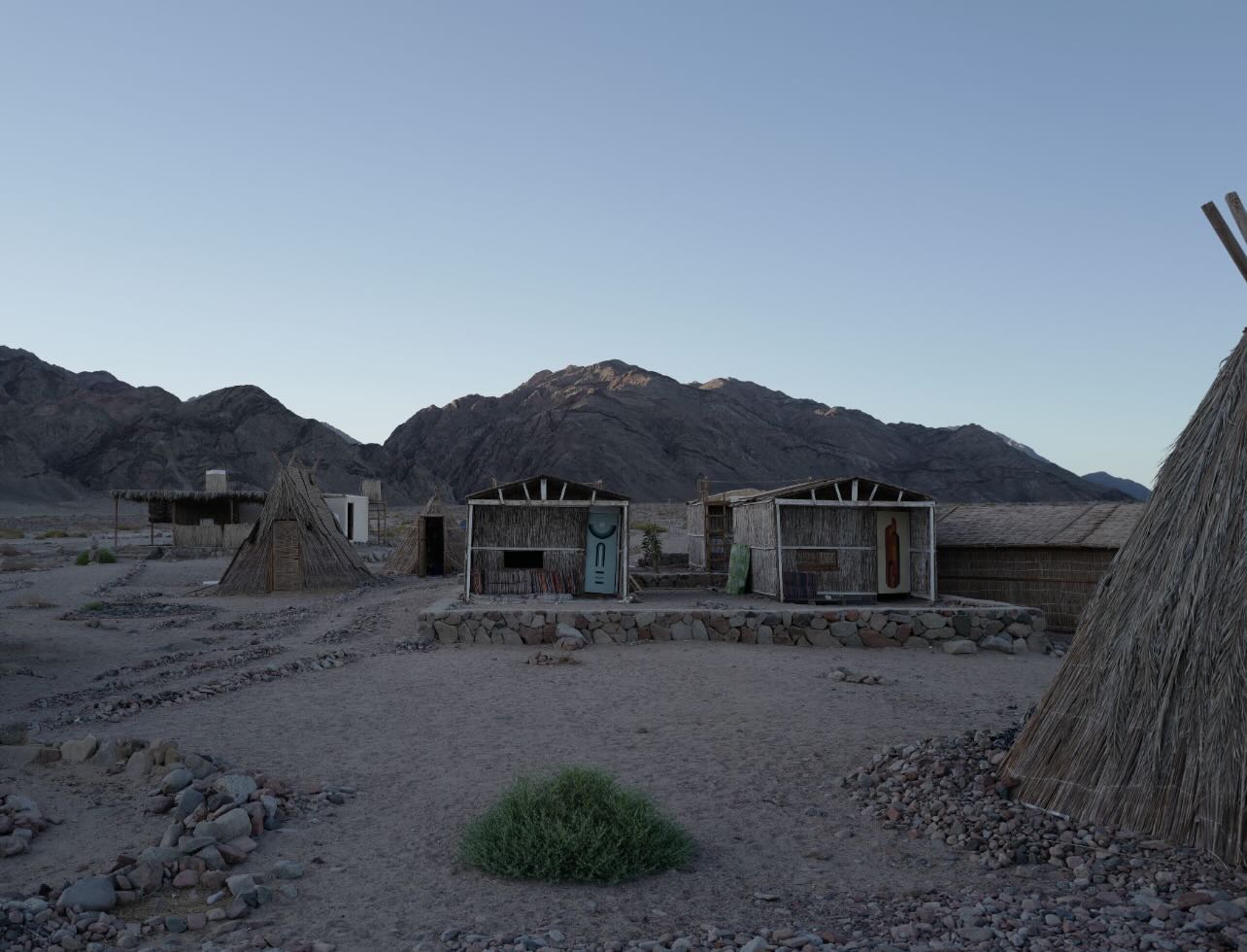
With most of the cargo unloaded, a few people climbed one after another into the back of a worn-out pickup truck. They still had to continue northward, heading to a nearby lagoon.
At that moment, a few Bedouin girls suddenly appeared from somewhere. Their skin was dark, their eyes bright. When they reached us, they opened small bundles and took out some handmade woven trinkets, hoping we might buy something.
I quickly shook my head and said, “La la, shukran. No, thank you.”
They pleaded softly for a moment, but seeing no one wanted to buy, they gave up and went off to sit with the adults in the camp, chatting casually, their voices drifting lightly back and forth.
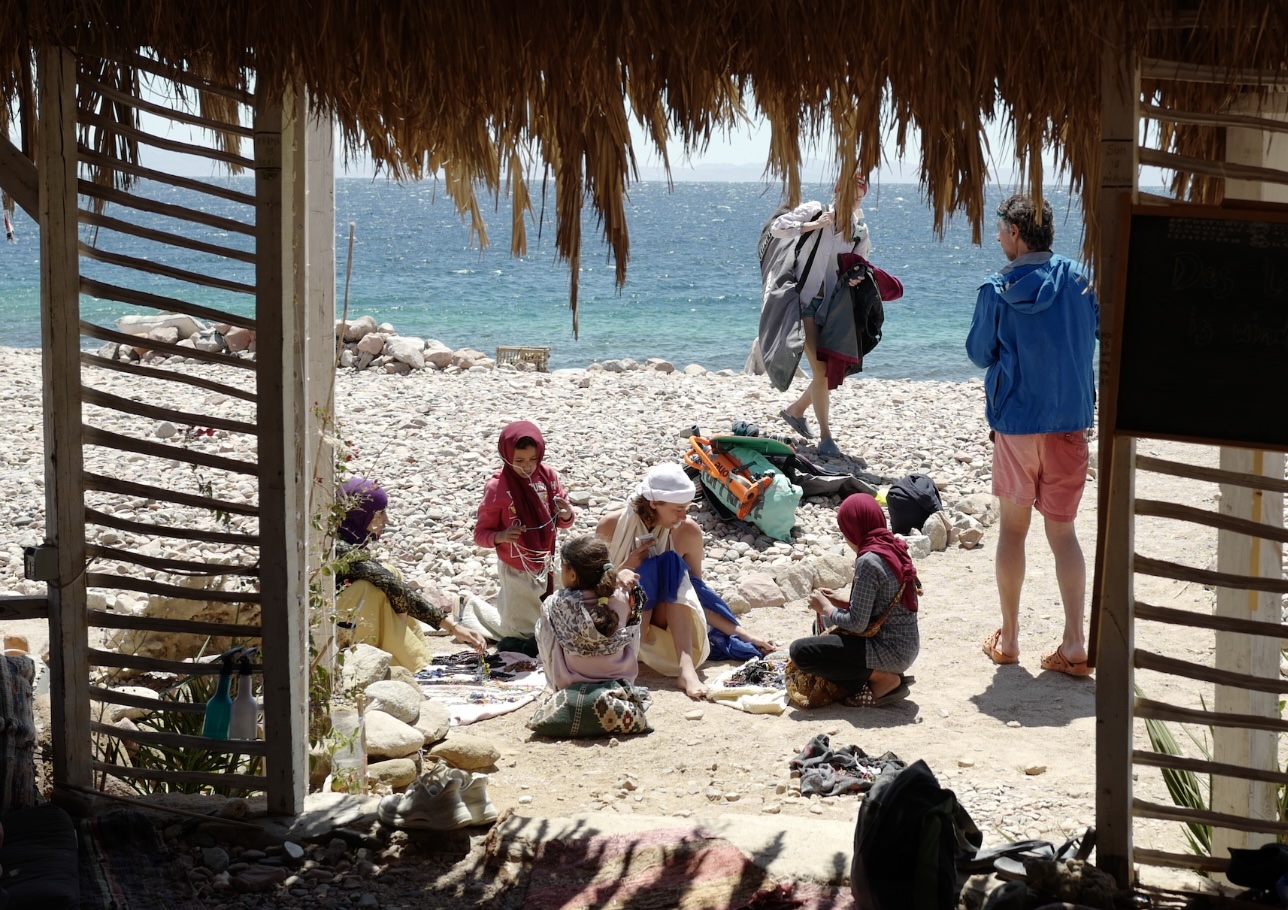
The journey and diving training over the past few days had taken a toll on my energy. With the wind picking up in Dahab and the temperature dropping, my throat began to feel slightly uncomfortable, like the early signs of a cold.
I tried to wrap my head tightly the whole way, but the howling sea wind still cut through my clothes. The splashing water dampened my clothing, making me colder and colder, and increasingly tired and achy.
Once settled, the first thing I wanted was some hot water to drink. It was only then that I truly realized how scarce drinking water was here.
In Germany, drinking water is never something you have to think about. Turn on the tap, fill a glass, bring it to your lips — such a natural set of actions, with no awareness of scarcity or limitation.
But in our camp, bottled drinking water was all brought in by boat from Dahab town. Each bottle was hard-earned and therefore precious. The camp kitchen was a simple thatched hut, with a faucet that had two outlets: one for seawater, one for freshwater. Even the freshwater wasn’t drinkable — just relatively cleaner.
To make a cup of hot water, you had to fill the kettle from the freshwater tap and slowly boil it over a gas stove. The simplest way.
Washing dishes required careful saving too. Most of the washing was done with seawater; only at the final rinse, if absolutely necessary, would the freshwater tap be turned on briefly to “freshen up.”
Though freshwater was scarce, the kitchen corner was rich with herbs. Rose, thyme, green tea, black tea, moringa, mint… various dried herbs neatly packed in small jars, stacked like a small mountain.
“Do you grow and dry and grind all these herbs yourselves?” I asked.
“Some we grow ourselves, some are brought from Dahab town. Occasionally, shamans visit and bring wonderful plants from all over,” said Ahmed. Suddenly he glanced at me, “Hey, why do you sound so out of sorts?”
“Maybe a bit of a cold.”
“Come.”
He beckoned me and led me to a corner of the hut. Squatting down, he gently rubbed a lush green plant with his fingers and held his thumb under my nose.
“Ah!” I instinctively took a deep breath and immediately felt awake from head to toe. “What is this?”
“This is Habak, which we grow ourselves,” Ahmed smiled, seeing my strong reaction. “Go to the kitchen, put some in the kettle, boil it, and drink it — your cold will get better.”
Habak is a local herb, somewhat like basil and mint combined. I hurried back to the kitchen, added a pinch of Habak to the kettle of water. While it slowly boiled on the stove, I couldn’t help but go back to crouch beside the plant, burying my head and taking deep sniffs.
“Abu Galoum is a very spiritual place,” said the sound healer nearby as he cooked, smiling. “It responds to everyone who comes here. The conflicts, energies, and problems inside you — all get magnified tenfold.”
I rubbed my chin, lost in thought, wondering if by his logic, maybe I carried too much negative energy.
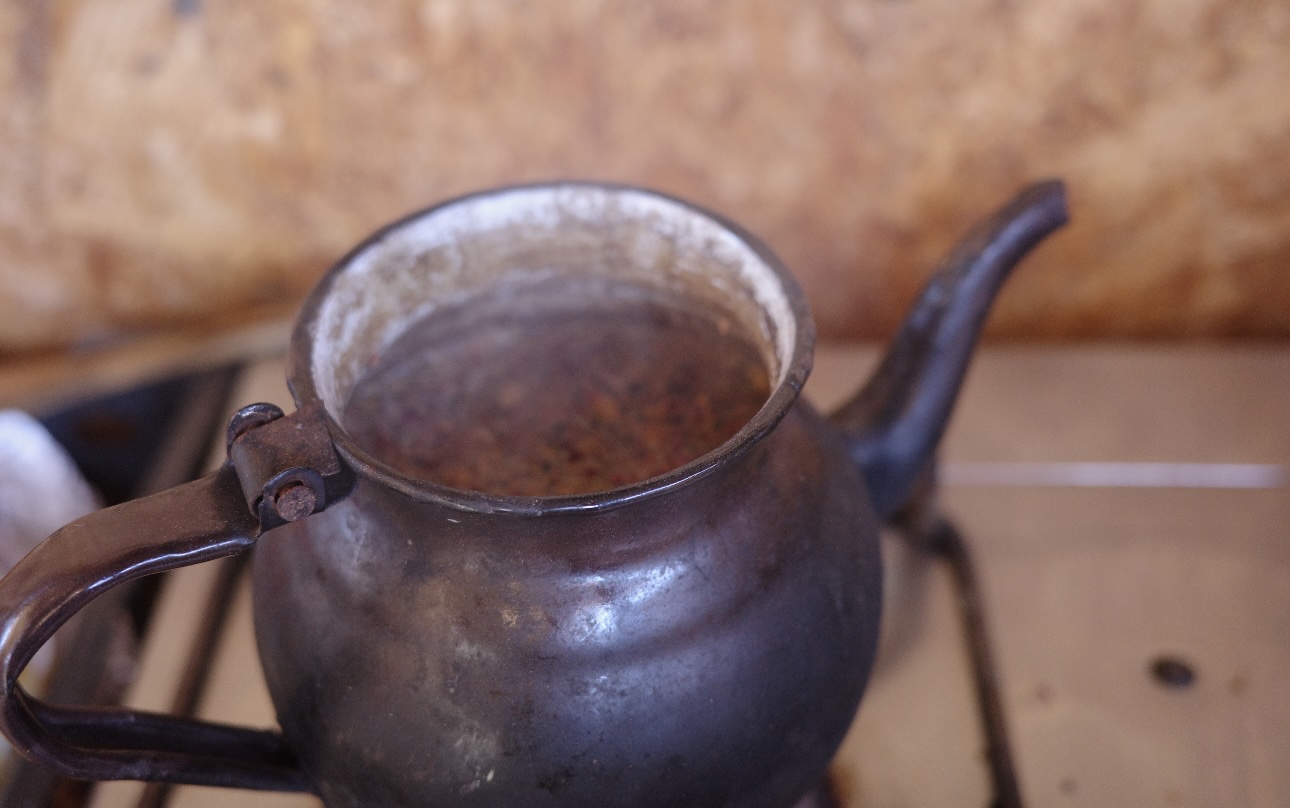
Like the tradition of the Bedouin people, there are no chairs here. The only two ways to rest are sitting on the ground or lying down. Whether you want to sit or lie down, you can do it anytime, anywhere.
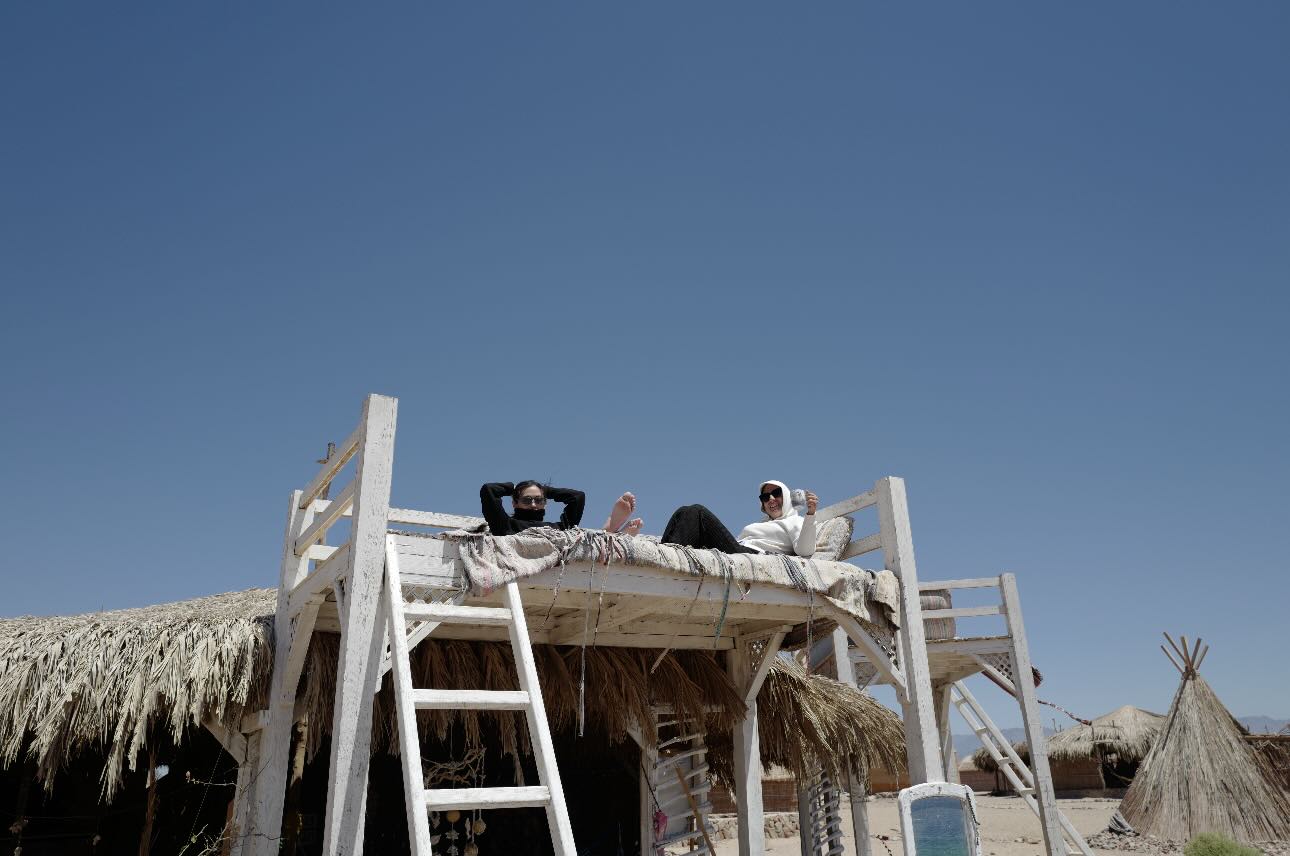
There are no entertainment activities here, and there’s no cell phone signal. The time that would usually be spent watching TV or scrolling on the phone can only be spent lying down, reclining, watching the sky, the mountains, the sea, reading… and then seeing who gets bored first.
The winner of this boredom contest was one of our friends. She was the first to slap her thigh and suggest, “Let’s go check out the lagoon to the north!”
So we told Ahmed our idea. He took out his phone, made a quick call among locals, and said, “The taxi will be here in ten minutes.”
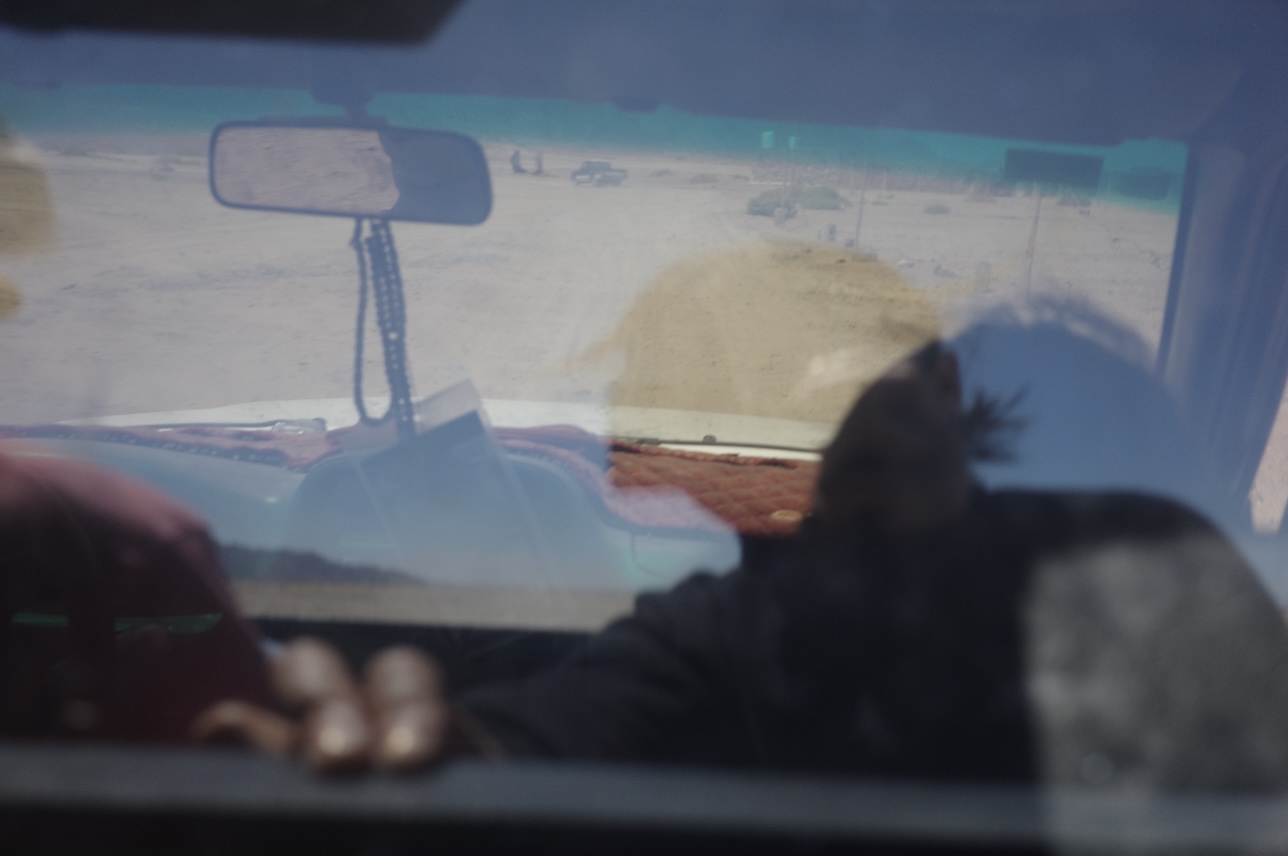
After a while, a Nissan pickup truck approached from the distance.
The driver, Mohamed, wore a spotless white robe and a matching white headscarf that seemed to glow under the sunlight.
For the Bedouins, their pickup trucks are like their homes. The truck bed was lined with two blankets, allowing passengers to sit comfortably inside. Whether carrying goods or people, it was straightforward and practical.
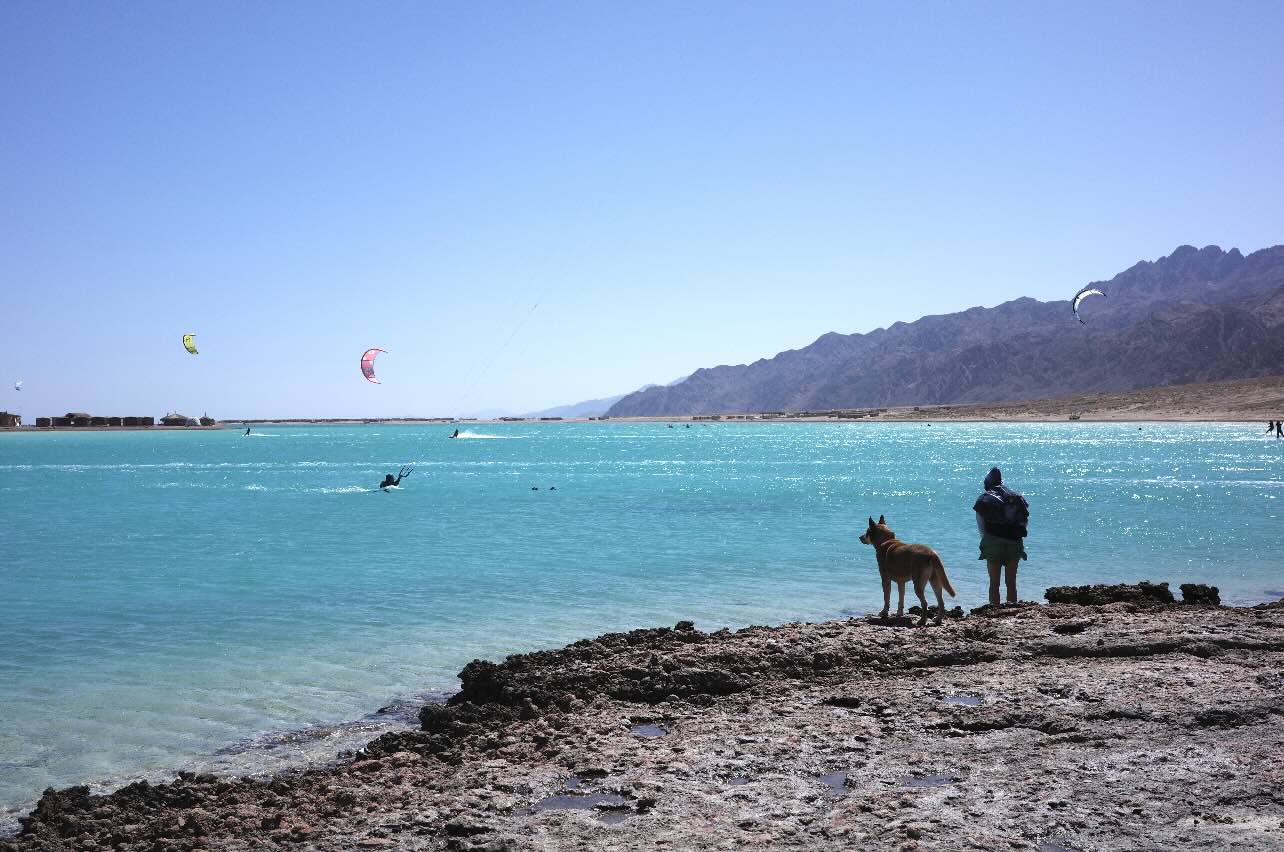
About ten minutes later, we arrived at the lagoon.
The most striking impression was how unreal the blue color was.
Like Abu Galoum, this place was also dotted with thatched huts, but it was livelier than our camp.
Many Egyptians come here for day trips without staying overnight, so the huts here had a bit of a “rustic guesthouse” vibe.
The lagoon’s surface was filled with kite surfers coming and going, almost every one of them seeming like an expert. When people on the shore were taking photos, some surfers would even ride close to the shore and perform aerial flips, putting on an impromptu show.
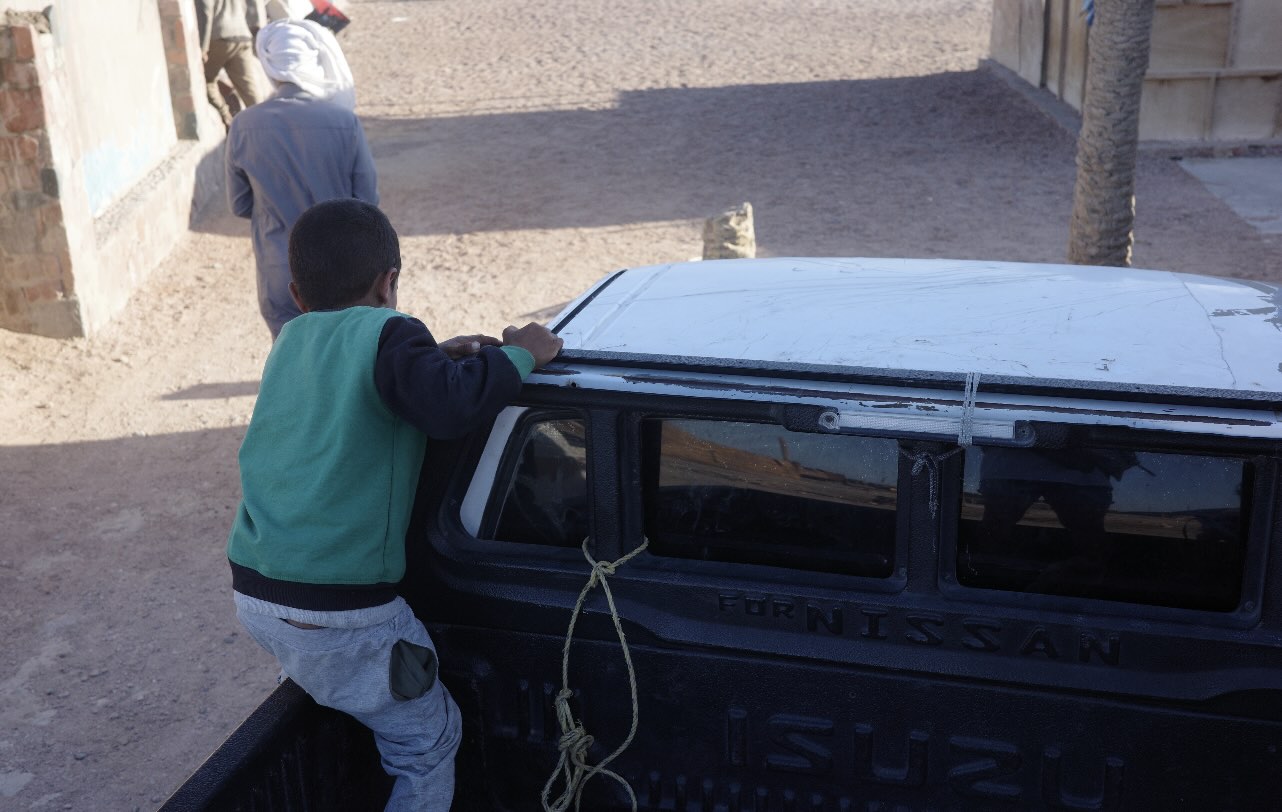
On the way back, Mohamed brought along his son.
The boy jumped into the back of the pickup truck in one quick step and sat next to me, babbling a string of Arabic words.
I didn’t understand a single word, so I just stuck out my tongue in helplessness. What surprised me was that these kids, who looked no older than eight or nine, spoke with such strong, confident voices. Looking into their eyes, it was clear that inside those small bodies lived calm little adults.
These kids wander outside all day long—don’t they go to school?
That question flashed through my mind, but then I realized it was too narrow a perspective.
Look at them: ten years old and already driving pickup trucks, agile and quick-witted.
In the desert wilderness, there are no roads and no traffic signs. What they really need to learn isn’t traffic rules, but how to get a broken-down vehicle running again under the most basic conditions.
I remembered a brief breakdown on the way from the canyon back to Dahab a few days ago.
The driver wasn’t worried at all. He leisurely pulled out the ignition coil from under the steering wheel, tried to pinch the copper wire with his fingernails a few times—no luck. Then he opened the glove compartment, took out a regular wire, peeled the insulation off like peeling a grape, pulled out a brand-new copper wire, wrapped it around the ignition coil, fiddled with it for a bit, plugged it back in—and the engine started.
In his world, he was a sage.
Everyone, on their own familiar land, knows how to grow and gain wisdom.
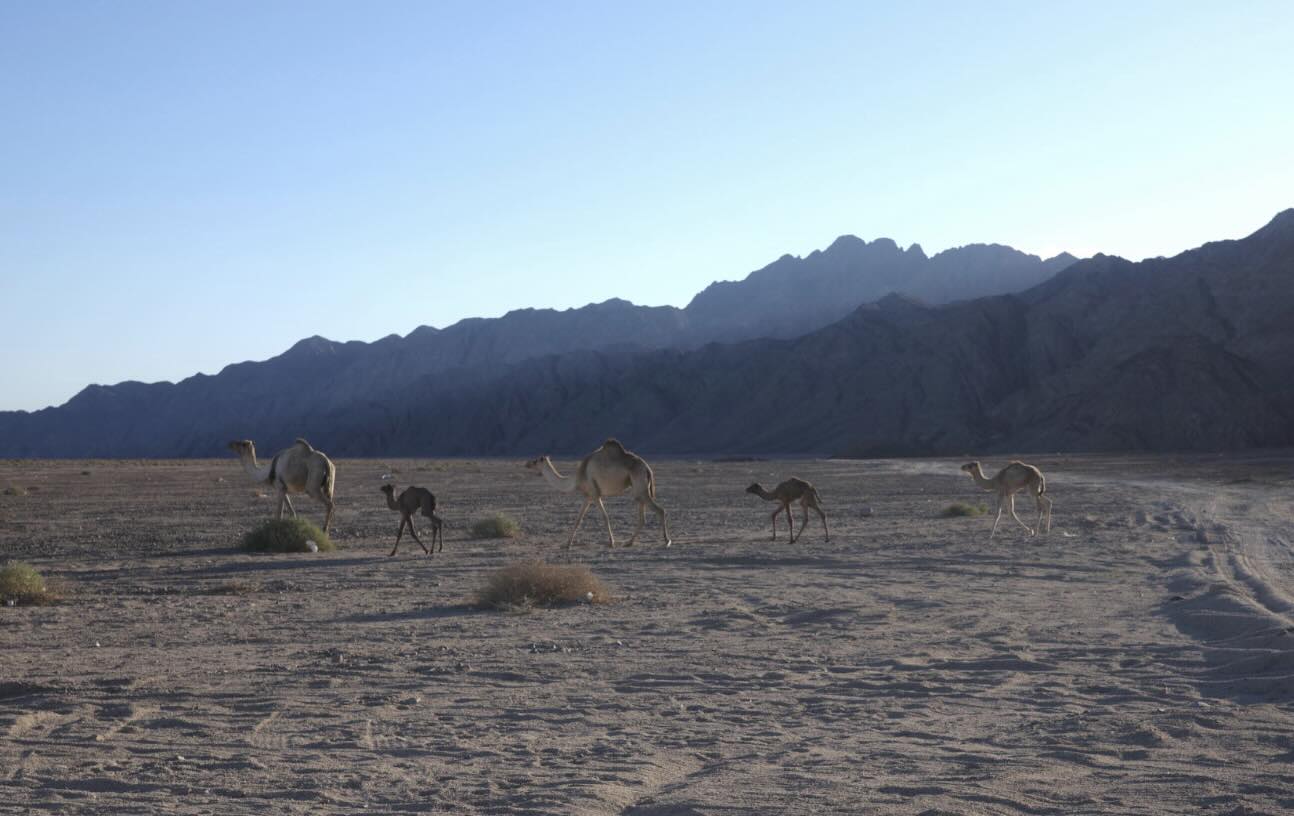
At dusk, the mountains of Saudi Arabia across the Red Sea were bathed in a gentle orange-red glow from the setting sun. Just behind those mountains, a full moon slowly rose, like a silent divine lantern illuminating the heavens and earth.
“The moon is out! The moon is out!” The people in the camp cheered, as if welcoming a beloved relative from afar.
My friend climbed onto the roof of a thatched hut, spread her arms wide toward the moon, as if to embrace the entire moonlight. She shouted loudly, “Please grant me energy!”
I followed her up. At that moment, distant sounds of intermittent howling filled the air. Dogs were howling, and so were some people. Everyone was ecstatic.
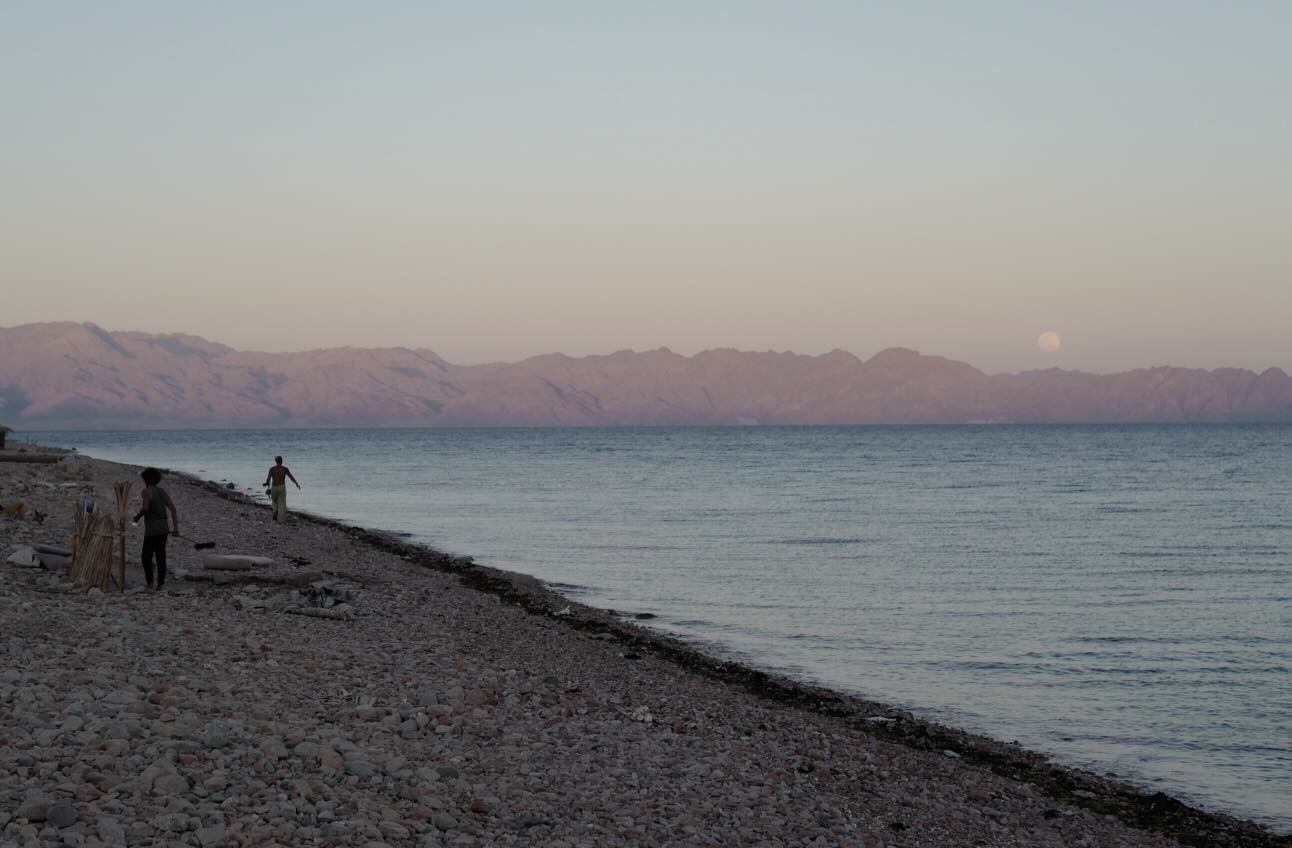
Back at the camp, the sound healer had transformed into the chef, busy preparing dinner for everyone. Roasted vegetables, various kinds of hummus, refreshing salads, and sweet halva… For some reason, in his hands, these seemingly simple ingredients turned into astonishingly delicious dishes, as if by magic.
On this barren land, how fortunate we were to enjoy such a rich and nourishing meal.
Perhaps this was another form of healing.
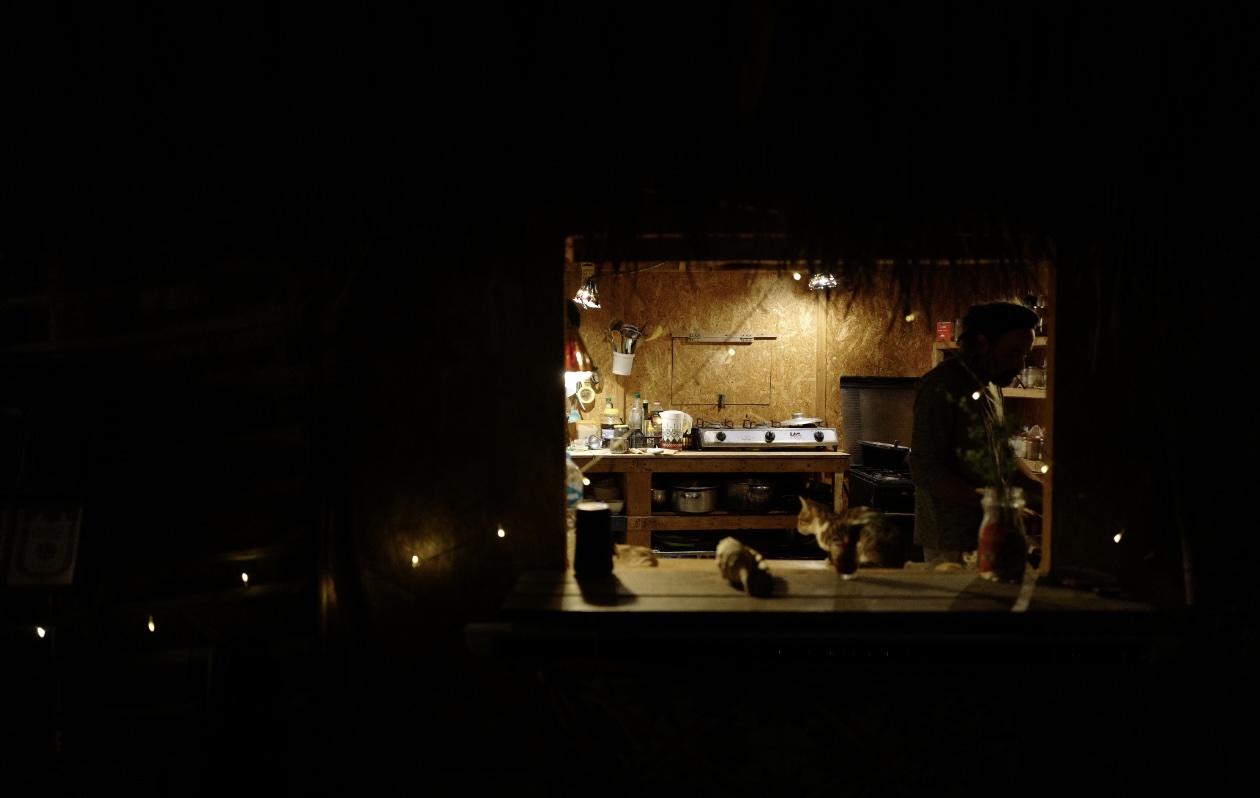
After dinner, the chef had finished his work. He sat down in a corner, picked up a guitar, and began to play and sing.
A traveler who was supposed to do the dishes today saw this, abandoned the task, and sat beside the sound healer to join in the singing.
I didn’t understand the meaning of the Arabic lyrics. The woman’s husky voice was very ethereal. There was a powerful energy flowing through the music they shared.
She reminded me of Fatima, the Bedouin girl from The Alchemist. She waits in the desert and says, “Love is the language of the universe.”
I seemed to hear the language of the universe.
